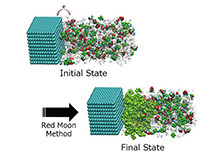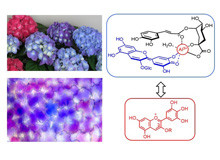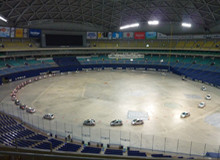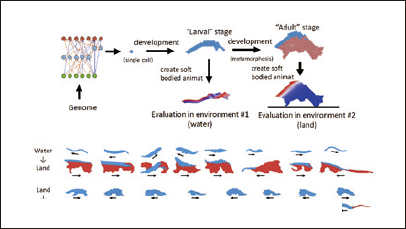Summary
At the Department of Complex Systems Science, we conduct research and education targeting complex systems in nature and society. “Complex systems in nature and society” is a network in which many elements such as molecule, neuron, agents and the like have the ability to transmit, convert and store complicatedly intertwined “information”. This department promotes research from the viewpoint of informatics, considering “complex systems” as distributed information systems which creates an “information flow”.
A major feature of the “complex system” is its self-organization that dynamically and autonomously produces order structure and higher-order functions that through their interactions between other elements creates and that are unexpected by the nature of element alone. We, at the Department of Complex Systems Science, develop innovative methods of theory, experiments and calculations. We consider the self-organization process of such structures and functions as ‘information processing’ process, based on the dynamics of “information ow” whereby creating practical “knowledge”. In order to achieve our goal, in addition to the discovery, development and application of various innovative methodologies, we conduct education on the compositional method of “understand by creating” which is a model not bound by traditional methods, instead opting to develop complex system phenomena based on a wide variety of real world variables such as nature, human beings, society and artifacts.
Through these education and research activities, our goal is to foster excellent engineers and researchers who can understand real world phenomena from the viewpoint of simulation and data science; can apply the principle of information ow to distributed information system; and can create knowledge and technology based on innovative, comprehensive and constructive thinking.
Intellectuals with such knowledge and abilities are expected to contribute to society through careers as, developers who create new products and services utilizing their simulation and design abilities at companies, and specialists who can make use of their innovative strategies to assist governments and government agencies.
Curriculum
Complex Systems Sciences 1・2
Many Body Systems A・B
Modern Mathematics and Mechanics
Information Physics
Materials Information Dynamics 1・2
Computational Quantum Chemistry 1・2
Micro/Nano-scale Physics and Informatics 1・2
Natural products and bioorganic chemistry A・B
Chemoinformatics
Genetic information system 1・2
Bioinformatics 1・2
Artificial Life 1・2
Emergent Computing 1・2
Environmental Informatics 1・2
Complex Systems Programming 1・2
Computational Aspects of Complex Systems 1・2
Bio-sensing
Sensory Information Processing
Optimum Design 1・2
Flow Advection
Fluid Informatics
Information Visualization 1・Material simulation 2
Large-scale Complex Systems Computation 1・2
Frontiers of Computational Science Lecture – Topics in Frontiers of Computational Science
Advanced Lectures on Large-scale Parallel Computing
Units, Members
Many-Body Systems Science Unit
This Unit aims to develop information physics based on viewpoints and methods such as statistical mechanics, quantum mechanics, computational physics and such to examine and analyze the principles of collaborative phenomena that many-body systems created by nature and society. At the same time, we train intellectuals who can formulate and solve complicated problems using the methods developed though information physics.
Faculty Members
Prof. TANIMURA,Shogo TOKITA, Keiichiro NAKAMURA, Yasuyuki*
* Institute of Liberal Arts and Sciences
Life-Science Informatics Unit
Our goal in this Unit is to consider the biological phenomena of various scales as dynamical changes of biological constituent molecules, and to elucidate those mechanisms through the collaboration of experiment and theory (calculation). At the same time, we foster intellectuals who can identify significant information from large amounts of data in the post-genome era, and are capable of building a realistic view of life based on the principle of physical chemistry.
Faculty Members
Prof. OTA, Motonori YAMANISHI, Yoshihiro
Assoc. Prof. AOKI, Setsuyuki
Lecturer TSUKAMOTO, Masaki
Assis. Prof. KOIKE, Ryotaro
Materials Informatics Unit
This Unit aims to elucidate the process by which information ow in complicated molecular phenomena is integrated and organized into functional expression, by using information technologies simulating nature as a large scale multilayered system. At the same time, we aim to establish the principle of creating information functional substances and conduct education and research on that material based information process.
Faculty Members
Prof. NAGAOKA, Masataka YOSHIDA, Norio
Assis. Prof. IUCHI, Satoru
Emergent Systems Unit
This Unit aims to consider the information ow in nature and social phenomena as the emergent phenomena caused by the interaction among elements, and elucidate the principle by making use of mathematical models, simulation, experiments, data analysis and so on. At the same time, we conduct education and research to apply new theory and solve real social problems.
Faculty Members
Prof. ARITA, Takaya KITA, Eisuke
Assoc. Prof. NAGAMINE, Koichiro SUZUKI, Reiji
Complex Systems Computation Unit
Our purpose of this Unit is to examine mathematical models and calculation methods using an informatics approach, for investigating complex system phenomena that exhibited by nonlinear dynamics and human behavior. At the same time, we conduct education and research on complex system computation theory which enables prediction, control and design of the complex system phenomena.
Faculty Members
Prof. ZHANG, Hedong MATSUDA, Keigo
Assoc. Prof. SUZUKI, Yasuhiro
Information Visualization Unit
In this Unit we use the “information analysis method” to extract useful information from huge data sets which are spatially and temporally ubiquitous for the real system of nature and society. Furthermore, we will conduct education and research aimed at understanding the real system and building better analysis methods.
Faculty Members
Prof. UCHIYAMA, Tomomi
Assoc. Prof. YASUDA, Koji*
Assis. Prof. TAKAMURE, Kotaro
* Institute of Materials and Systems for Sustainability

Unveiling Mechanisms of Complex Materials Synthesis with Unique Methods(Ex. Application to Lithium Ion Batteries, etc.)

Color change of hydrangea is a phenomenon of complex system due to the formation of blue supramolecule.

Traffic jam experiment using real vehicles in Nagoya Dome

Top: A computational model for the evolution of metamorphosis, Bottom: 16 examples of evolved metamorphosis (Upper: aquatic larvae -> terrestrial adults, Bottom: terrestrial larvae -> aquatic adults). Fitness is a geometric mean of creature’s moving distances in their larval and adult stages.

Intelligent robotics based on mechanism of human tactile recognition


